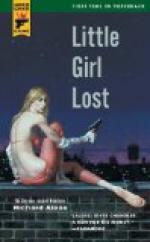The reaction from the excitement of the evening left Sexton dull and drowsy once he felt secure from any possible danger. His only desire was to lie quiet, and forget. Stretched out on a comfortable lounge, he fell asleep almost instantly, making no effort even to remove his clothes. West was of a different temperament, his mind far too active to find sleep possible. His only desire was to think, plan, decide upon some future course of action. With mind busy, forgetful of the very presence of his companion, he indulged in a bath, again dressed himself, and, lighting a cigar, settled back into an easy chair to fight the whole out alone with himself.
The adventures of the night had greatly changed his conception of this affair in which he had become so strangely involved. The mystery confronting him appeared more difficult of solution than ever. His first vague theory of the case had already gone completely to smash. Question after question rose before him which remained unanswered. He was more thoroughly convinced than ever that Percival Coolidge had been murdered; that the act had been committed either by Hobart himself, or under his direction. He possessed no proof, however, nor could he figure out a motive for the crime. Who was this Jim Hobart? That was one of the first things to be learned. Was he in any way personally interested in the fortune left by Stephen Coolidge? Or did he hold any special relationship with the murdered man? How could he expect to profit by the sudden death of Percival? More important still, what peculiar influence did the fellow exert over the girl? Here was by far the deeper mystery, the one that troubled him most. The others seemed possible of explanation, but the sudden change in Natalie Coolidge was beyond all understanding.
Except in face, form, dress, outward appearance, she no longer seemed to West as being the same woman he had formerly known. His original interest in her had vanished; he had learned to distrust and doubt her sincerity and truth. Beyond all question she was openly playing an important part in this tragedy under Hobart’s direction, but for the life of him he could not figure out to what end. Still the very mystery of it had its fascination. While he felt no longer any special desire to serve her, to further risk his life in her cause, yet he experienced a fierce determination to learn what all this really meant; to uncover the object these conspirators had in view. Although he imagined love no longer spurred him on, his real interest in the affair became even more intense, with an aroused desire to read the riddle. He convinced himself that from henceforth this was to be his only object—not the girl, nor any attraction she once had for him, but a stern determination to solve this crime, and bring its perpetrators to justice. If she was involved it could not be helped, she would have to suffer with the rest; his own duty was clear.




